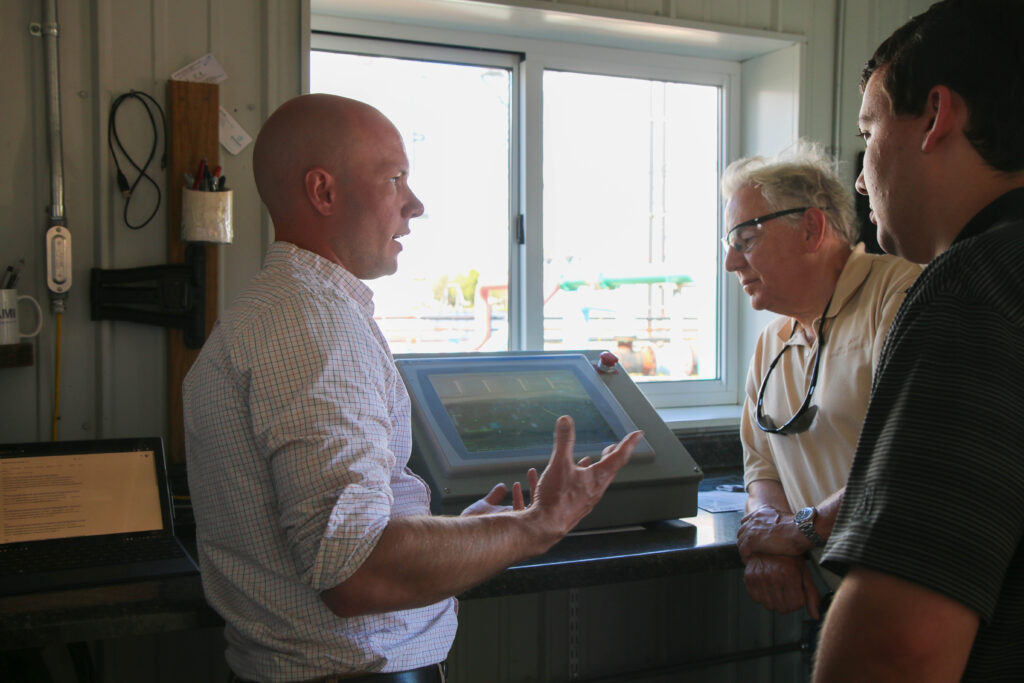
Chemical Analysis of Environmental Samples
- Metal analyses (i.e., mercury, copper, cadmium, zinc, magnesium, chromium, arsenic, lead, manganese, iron, nickel, selenium, and silver)
- Inorganic chemical analyses (i.e., ammonia, nitrates, phosphates, chloride, and sulfate)
- Analysis of organic compounds utilizing chromatographic techniques
- Measurements of acid volatile sulfides (AVS) and simultaneously extracted metals (SEM), total and dissolved organic carbon, and grain size for sediment samples
- Analysis of total chlorophyll and chlorophyll a concentrations
- Sample preparation designed to address quality assurance/quality control standards
- Laboratory instruments available for analyses include:
- flame/graphite furnace atomic absorption spectrophotometer
- mercury analyzer
- gas chromatograph with flame ionization detector
- gas chromatograph with mass selective detector
- high pressure liquid chromatograph with variable wavelength and evaporative light scattering detectors
- ultra-high pressure liquid chromatograph with diode array detector
- visible/ultraviolet spectrophotometer
- organic carbon analyzer
- automatic titrator
- analytical balances
E. coli Certification
The Lake Superior Research Institute (LSRI) is certified for Total Coliform and E. coli analysis of drinking water by the Wisconsin Department of Agriculture, Trade, and Consumer Protection (DATCP).
The evaluation was performed to verify that the LSRI Microbiology Laboratory meets all of the requirements outlined in the EPA Manual for the Certification of Laboratories Analyzing Drinking Water (fifth ed., 2005). This certification allows the LSRI Microbiology Laboratory to perform Total Coliform and E. coli analysis on drinking water for Wisconsin compliance. It also enables LSRI to perform these analyses on surface water samples collected for monitoring E. coli concentrations at recreational beaches. LSRI will apply for recertification at the end of December 2015.
A complete list of laboratories with this certification can be found at the Wisconsin Department of Natural Resources.
Data Management, Data Processing and Data Distribution Services
- Extensive inventory of packaged and customized software packages for various data storage, processing, and analytical needs
- Large inventory of hardware including several computer workstations, a high storage dedicated server, plotters, and full web site capability
- Experienced, qualified personnel to provide full data processing, database design and management, programming, application design, data distribution, and internet services
Field Sampling
- Three small research boats (16-18 feet) equipped with 20-25 horsepower motors for sampling water, sediment, plankton, fish, and benthic invertebrates within harbors and inland lakes
- Full-sized, crew-cab, pick-up truck, and mini vans
Geographic Information Systems
- Capability of integrating Geographic Information Systems with various database applications
- Spatial analyses of population distribution data
- Geo-spatial data collection and interpretation in a variety of biological fields
Quality Assurance/Quality Control Program
- Adherence to a LSRI general Quality Assurance plan addressing the objectives of precision, bias, representativeness, completeness, accuracy, sensitivity, and comparability to ensure the generation of quality scientific data for all research projects
- Use of internal quality control checks for field and laboratory activities (i.e., replicates, spikes, procedural/reagent blanks, calibration standards, certified standard reference materials, control charts, establishment of instrument and method detection limits)
- Comprehensive standard operating procedures for all aspects of field and laboratory activities (i.e., personnel, record keeping, quality assurance, animal care/test systems, neurobehavioral toxicology, aquatic toxicology, ecological modeling, field studies, general lab maintenance, test substances, sample analysis and processing)
- Annual training workshops on “Good Laboratory Practices” (GLP) principles
- Development of chain-of-custody and data forms to ensure proper documentation of samples and measurements
- Several customized data processing steps and procedures have been designed to insure the accuracy and integrity of all LSRI data populating the various databases. These include controlling checks on all data entry forms, and several processing, outlier, and data integrity checks on all data before distribution.
Taxonomy and Collection of Biological Samples
- Identification of aquatic macroinvertebrates and general environmental monitoring from all types of freshwater habitats
- Identification of zooplankton organisms (cladocerans, copepods, rotifers)
- Collection of quantitative and qualitative samples of aquatic macroinvertebrates and zooplankton
- Design expertise in macroinvertebrate and zooplankton sampling regimes, statistical analyses, and data interpretation
- Use of digitizing equipment with photographic capabilities for measuring macroinvertebrates and zooplankton along with archiving sample images
- Identification and collection of plants, both invasive and native
Toxicity Testing
- Capability of performing 10- to 28-day solid phase sediment toxicity tests using the Sediment Testing Intermittent Renewal (STIR) System and 3-8 replicates with a maximum of 32 treatments
- Culturing of aquatic benthic organisms (Hyalella azteca and Lumbriculus variegatus) for use in solid phase sediment toxicity tests
- Expertise in conducting 28-day bioaccumulation sediment toxicity tests
- Proficiency in performing 7-day static renewal sediment elutriate tests with Ceriodaphnia dubia, Daphnia magna, and Pimephales promelas (all organisms cultured in LSRI’s facilities)
- Experience in conducting 7-day solid phase sediment toxicity tests with larval Pimephales promelas
- Capability of flow-through or static renewal water-only acute and chronic toxicity tests with the following additional test species: Lepomis macrochirus, Oncorhynchus mykiss, Selenastrum capicornutum, and Lemna minor
Rates for Trucks and Small Crafts
The Lake Superior Research Institute (LSRI)’s rates for truck and small craft rentals are:
- Trucks: $100/day plus mileage at $0.70/mile
- Small Crafts: $100/day
These rates include cost recovery for items such as maintenance, insurance, repairs/replacement, and depreciation.
These rates are subject to change at any time.